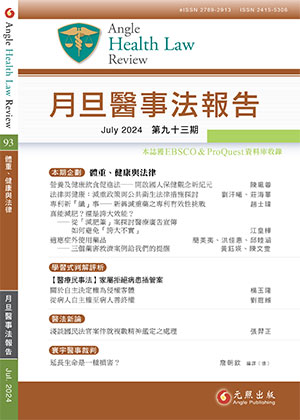改善精神疾病患者之安樂死管控:從比利時看安樂死的刑事法院判決(三)【全球瞭望】 試閱
Improving Control over Euthanasia of Persons with Psychiatric Illness: Lessons from the First Belgian Criminal Court Case Concerning Euthanasia(III)
一、背景:比利時是少數幾個允許精神疾病患者進行安樂死的國家,近期比利時第一個關於醫生涉及安樂死之刑案判決出爐,該案件中三位醫生遭指控未遵守比利時安樂死法(Belgian Euthanasia Law)關於女性精神疾病患者要申請安樂死之相關規範,因而面臨毒殺(murder by poisoning)的指控,雖然最後三位醫生均獲判無罪,但該案件在政策制定者、醫療人員,以及社會大眾均引發不少爭論。
二、方法:我們將此判決作為批判性分析的起點,研究包含比利時安樂死法所建構的三層管控系統之適當性,以及法規適用於精神疾病所產生無法忍受之痛苦作為申請安樂死依據之患者之情形,此研究之分析基於刑事案件審理中所產生之相關訊息及報章媒體中有關安樂死之資訊。
三、結果:我們的分析凸顯出在評估及允許安樂死申請案件存在重大之問題,該患者並未證實其所罹患之精神疾病是沒有改善可能性的,以及其痛苦是屬於無法緩解之前提下,即被執行安樂死,在比利時安樂死法所建立以及聯邦安樂死監督和評估委員會(the Federal Control and Evaluation Commission on Euthanasia, FCECE)所推廣執行之三層管控系統經研究顯示,在每層管控均屬失敗。
四、結論:為評估精神疾病患者因心理折磨痛苦所申請安樂死之案件,比利時安樂死法應該修法規範必須要取得兩位精神科醫生之意見,並要求所有案件參與之醫生應進行面對面討論,在評估安樂死申請之過程中,應該要同時確認已經嘗試合理且有佐證的療程以及以康復為導向的其他選擇。
Background: Belgium is one of very few countries that legally allow euthanasia for suffering caused by psychiatric illness. In the first criminal trial in Belgium of physicians involved in euthanasia, three physicians recently faced the accusation of “murder by poisoning,” for allegedly having failed to comply with several requirements of the Belgian Euthanasia Law in granting the euthanasia request a woman suffering from psychiatric illness. Although all three physicians were acquitted, the case generated much debate among policy makers, medical professionals, and the general public.
Method: We use this trial as the starting point for a critical analysis of the adequacy of the three-level control system established in the Euthanasia Law, as it is applied in the evaluation of euthanasia requests from persons who suffer unbearably from a psychiatric illness. This analysis is based on information presented during the criminal trial as well as information on the euthanasia that was published in the press.
Results: Our analysis highlights substantial problems in the assessment and granting of the euthanasia request. The patient was euthanized without it having been substantiated that her psychiatric illness had no prospect of improvement and that her suffering could not be alleviated. The three step control system enshrined in the Law and promoted by the Federal Control and Evaluation Commission for Euthanasia appears to have failed at each level.
Conclusion: To evaluate requests for euthanasia for mental suffering caused by psychiatric illness, the requirements of the Belgian Euthanasia Law should be complemented by mandating the advice of two psychiatrists, and face-to-face discussions between all physicians involved. In parallel with the process of evaluating the euthanasia request, a treatment track should be guaranteed where reasonable evidence-based treatments and recovery-oriented options are tried.
104-117






